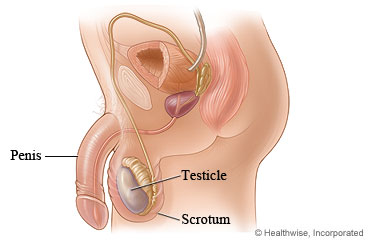Varicocele Repair: What to Expect at Home
Your Recovery

A varicocele (say "VAR-uh-koh-seel") is a large vein that forms in
the scrotum. The blood pools, making the vein larger than normal. To
fix the problem, your doctor tied off the veins. After surgery, you
may have slight pain in your groin for 3 to 6 weeks. Your scrotum
and groin may be bruised and swollen. This will go away in 3 to 4
weeks.
You will probably be able to return to work or your normal routine
in 2 to 3 days after surgery, depending on your job. If your job
involves intense activity or heavy lifting, you may need to wait 2
weeks or until your doctor says you are ready to go back.
You may need to wear snug underwear or compression shorts for about
2 weeks after the surgery or as your doctor instructs you.
This care sheet gives you a general idea about how long it will take
for you to recover. But each person recovers at a different pace.
Follow the steps below to get better as quickly as possible.
How can you care for yourself at home?

Activity
|
|
|
|
|
|
|
|
-
Avoid intense activities, such as bicycle riding, jogging,
weight lifting, or aerobic exercise, for 2 to 3 weeks
after the surgery or until your doctor says it is okay.
|
|
|
-
For about 2 weeks after surgery, avoid lifting more than
about 10 pounds. This may include a child, heavy grocery
bags and milk containers, a heavy briefcase or backpack,
cat litter or dog food bags, or a vacuum cleaner.
|
|
|
|
|
|
|
|
|
|
|
|
|

Diet
|
|
-
You can eat your normal diet. If your stomach is upset,
try bland, low-fat foods like plain rice, broiled chicken,
toast, and yogurt.
|
|
|
-
You may notice that your bowel movements are not regular
right after your surgery. This is common. Try to avoid
constipation and straining with bowel movements. You may
want to take a fiber supplement every day. If you have not
had a bowel movement after a couple of days, ask your
doctor about taking a mild laxative.
|

Medicines

Incision
care

Ice
Follow-up care is a key part of your treatment and safety. Be
sure to make and go to all appointments, and call your doctor if you
are having problems. It's also a good idea to know your test results
and keep a list of the medicines you take.
When should you call for help?
 Call 911 anytime you think you may need emergency care.
For example, call if:
Call 911 anytime you think you may need emergency care.
For example, call if:
Call your doctor now or seek immediate medical care if:
Watch closely for any changes in your health, and be sure to contact
your doctor if:
Current as of: November 15, 2023
Content Version: 14.0
Care instructions adapted under license by your healthcare professional. If you have questions about a medical condition or this instruction, always ask your healthcare professional. Healthwise, Incorporated disclaims any warranty or liability for your use of this information.